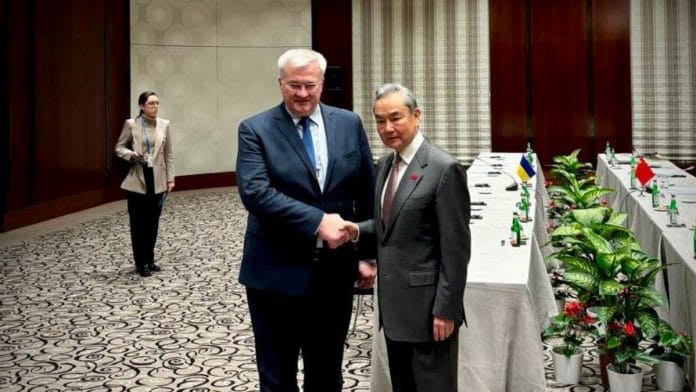China’s role in the Russia-Ukraine war is once again a subject of scrutiny on Chinese internet platforms and within the country’s strategic circles.
With Donald Trump’s dramatic return to the White House, global dynamics are shifting chaotically. Looming over it all is the uncertain trajectory of the Russia-Ukraine war.
As doubts grow over the US’ leadership, Beijing aims to seize the moment to expand its influence and redefine its role on the world stage.
China isn’t switching sides
While Beijing has remained closely aligned with Moscow, Ukraine now frames China as a potential peace broker. A recent meeting between Chinese foreign minister Wang Yi and his Ukrainian counterpart, Andrii Sybiha, at the Munich Security Conference (MSC), sent ripples through diplomatic circles.
Wang’s language stood out—his calling Ukraine a “friend” carries considerable weight in China’s diplomatic lexicon. Many Chinese analysts and commentators interpret this as a sign that Beijing is positioning itself for a more active role in the crisis.
However, this shift does not mean China is distancing itself from Russia. Instead, it reflects a broader contest between Beijing and Washington, described by Renmin University’s Jin Canrong as ‘a decisive battle’.
Trump’s signals of reduced US support for Ukraine, coupled with his talks of brokering a peace deal, have created an opening that China is eager to exploit. Beijing does not want to be sidelined in global conflict resolution. Having already brokered a Saudi Arabia-Iran deal and the Myanmar ceasefire agreement, Ukraine appears to be its next diplomatic challenge. A successful involvement could elevate China’s global standing and strengthen its foothold in Europe.
Jiang Feng, chairman of the Shanghai Institute of Global Governance and Regional Studies, wrote that China’s prominent role at the MSC attracted attention. Many Europeans noted the contrast between Wang’s focus on China’s goodwill and US Vice President JD Vance’s isolationism, he added.
This situation, Feng argues, while fueling European concerns, also presents China with an opportunity to strengthen ties with the EU.
As the US falters, Chinese discourse reflects growing confidence in Beijing’s ability to fill the gap. Vance’s avoidance of critical issues such as the Russia-Ukraine war and tariffs during the MSC was framed by Chinese commentators as a failure to address European concerns.
Scholars like Xiao Qian of Tsinghua University argued that Vance’s omission frustrated European officials, widening the perceived gap between the priorities of the US and its allies. Zhou Bo from the same university noted that Europe’s primary concern—China’s stance on the war—was downplayed by Vance, further deepening European unease around Trump’s approach.
Meanwhile, Wang Junsheng of the Chinese Academy of Social Sciences suggested that while Trump is eager to push for negotiations, European leaders remain sceptical. Would a US-led peace initiative truly seek lasting stability or would it serve American interests alone, he wondered.
Also read: Hasina’s Houses of Horror to Yunus’ Devil Hunt – is Bangladesh truly changing for better?
Views on Trump
While this evolving landscape is an opportunity for China, it could also be interpreted as part of Trump’s strategy to end Russian President Vladimir Putin’s isolation. This has implications for China, especially since its partnership with Russia has been based on shared anti-Western sentiments.
One Chinese commentator outlined three reasons behind Trump’s push for a greater Chinese role in peace talks. First, Trump wants to leverage China’s influence to reduce US involvement costs and secure broader global support, particularly from the less developed nations. Second, he aims to sow discord between China and Russia by pressuring Beijing on issues where Moscow refuses to compromise. Third, Trump wants to present himself as a “peace-loving” leader while deflecting the blame from the US to NATO for provoking the conflict.
Some commentators on Baidu expressed scepticism about Trump’s approach, arguing that he is essentially “selling Ukraine”. While proposing a China-US-Russia summit and urging China to step up, they warn that this is merely a tactic. According to the commentators, once Trump completes his internal ‘rectification’, he is expected to resume attacks on both China and Russia.
On Weibo, Trump is being viewed as a betrayer who has abandoned Ukraine. Many users point out that this rapprochement with Russia is aimed at China, which has long been Trump’s target.
“Did Trump betray Ukraine,” wrote a Weibo user. “Small countries are merely pawns in the hands of big powers, used as bargaining chips in geopolitical deals.”
Also read: Trump’s F-35 offer tests Modi’s Atmanirbhar pitch. We can’t buy our way out of tech race
A more ‘inclusive’ mediator?
While the US sidelines Europe and Ukraine barely has a seat at the table, the discourse in China leans toward its role as an inclusive peace broker.
Commentator Chen Xi noted that Ukraine, once sceptical of China, now appears more appreciative, driven by shifting US attitudes. Amid the turbulent international landscape, Chen argued, China has maintained an independent and firm position on the Ukraine issue, positioning itself as a ‘mainstay’ in global conflicts.
In Chinese discourse, Beijing is being cast as a key mediator, and one more reliable and benevolent than Trump. At the same time, US objectives to divide Russia and China present a risk for Beijing. However, the prevailing discourse remains that China should seize the waning trust in the US to assert its global positioning, shape the narrative in global conflict resolution, and even try to de-escalate tensions with Europe.
Sana Hashmi is a fellow at Taiwan-Asia Exchange Foundation. She tweets @sanahashmi1. Views are personal.
(Edited by Prasanna Bachchhav)







Chinese future is dark. Get ready for next cold War. Because, USA solely motives is to stop china now. Now, no more, they care about Europe and Russia. American are practical. Rather than being emotional like European and Ukrainian